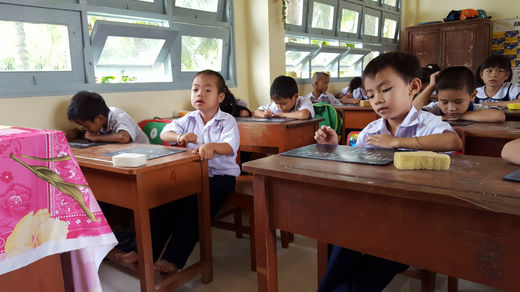|
|
|
Current project period |
2021 – 2025 (Can Tho) 2019-2022 (Hau Giang) |
|
Main partners |
|
|
Main outcomes |
People with disabilities are confident to participate in social activities and work life. Children with disabilities receive early intervention, inclusive education, and make transition to the next level of education. |
|
Outputs |
|
|
Outcome indicators |
|
The main barriers limited the social inclusion of pwds, which are:
1) Limited knowledge of PWD themselves, parents of CWD, and the community about their rights and ability. PWD feels inferior to other people in the community. Family members do not believe and have a wrong assessment about the ability of PWD, for example, they do not let the PWD go out of the house.
2) Education and other public services are not available and accessible for PWD. PWDs do not access to infrastructure, including toilets in hospitals or bus stations, or schools. People with hearing impairment are facing challenges in communication with other people.
3) Not any educational agencies in charge of coordinating inclusive education and early intervention service in the province. Teachers have limited competencies in teaching and working with CWDs. Lack of training material and resources which are relevant to types of disability.
4) Lack of support from communities and parents due to limited knowledge on disability issues. Health station practitioners do not certify disabilities for CWD, especially for those who have mental or intellectual impairment. Parents and caregivers do not accept their child’s impairments.
5) Presence of discrimination from communities. Discrimination against people with disabilities is a serious barrier to their participation in society Parents of children without disabilities do not agree to have their children studying in the same class with CWD.
Project interventions:
- The project cooperates closely with DOETs as well as DOLISA to implement IE model and inclusion works.
- The mindsets of local authorities, relevant stakeholders, CWD’s family, and PWDs themselves about the rights, the needs and abilities of PWDs will change through involving them in project activities, such as events, communication campaigns/ activities organized by DPOs.
- CAPD cooperates with local enterprises during implementing the project activities; and looks for job opportunities for PWDs who have vocational training and skills for working outsides.
- The project will empower key players of the resource center, schools, DPOs, Clubs, and local communities by providing direct support to target groups through training programs, sharing & learning experiences activities.
- The project supports to develop of early intervention units as well as provides the necessary equipment to ensure accessibility for CWDs; build capacity for teachers and managers, local community officers, core leaders of the organization of people with disabilities through training programs, experiences sharing and learning activities.
Read more about our work in the articles below:
